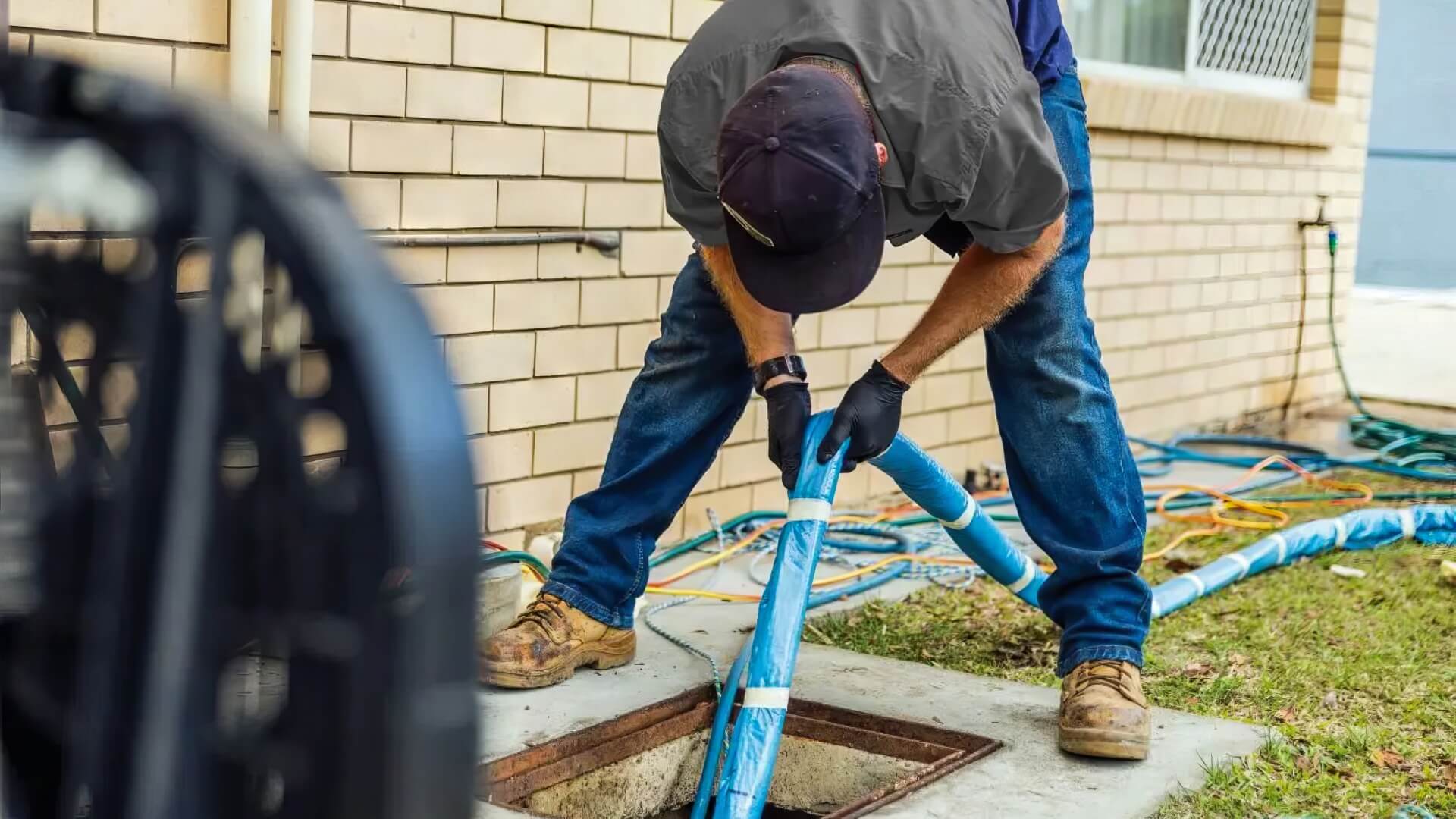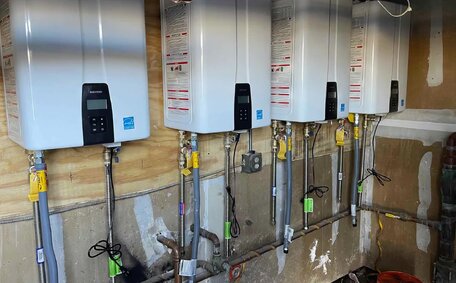Is Your Hot Water System Undersized for Your Household Usage?
A major cause for a depleted hot water supply is an undersized hot water system for your household requirements.
Assess if your system is undersized by evaluating these factors:
- Number of household members
- Average number of showers, baths, or sink/laundry uses per hour
- Length of average shower
- Number of bathrooms and laundry loads per day
- Your tank size for hot water storage, measured in litres
- Water heater’s flow rate in litres per minute or first hour rating of heated water
An average 4-person family typically requires a 150-190-litre water heater to avoid running out of hot water unexpectedly. To avoid running out of hot water, larger households should increase their hot water storage by approximately 40-75 litres per additional person. High water users, like growing families or households with teenagers, may see their hot water running out fast and thus require even more capacity.
To ensure you select the size water heater that’s a perfect match, incorporating factors like the tpr valve, Your plumber can assess if your heater can meet your current system needs, daily water usage, and suggest suitable tank dimensions tailored to your household.
Sediment Buildup Reducing Water Heater Efficiency
Sediment can build up around the anode rod over time, hindering water flow at the bottom of the tank. This sediment is among the most common reasons for hot water running out, clustering at the water tank bottom, composed of hard water mineral deposits and corrosion particles that have separated from the inner tank and its components.
As sediment accumulates, it reduces the efficiency of your water heater in a few key ways:
- Takes up capacity in the tank, resulting in less available hot water.
- Insulates the lower heating element, making it work harder to heat up the water.
- Clogs up valves and moving components.
- Can cause premature failure of heating elements and other internal parts.
Flush out sediment from your heater every six months as per manufacturer’s guidelines to maintain performance and hot water volume. This involves attaching a hose to the tank’s drain valve and flushing water through the system until it runs clear. To eject sediment and restore tank water clarity, your plumber can also perform professional flushes.
It’s quick preventative maintenance that keeps your water heater working efficiently for longer.
Faulty Thermostat Causing Inaccurate Temperature Regulation
The thermostat is an important component ensuring hot water your system delivers remains at an ideal temperature. It is usually set within the recommended range of approximately 50-60 degrees Celsius, and issues may arise if set too low or high. If faulty, the thermostat can fail to control the heating elements, resulting in water too hot or too cold.
Here’s how to check your thermostat functionality accurately as water runs through your system:
- Turn on the hot tap and let the water run for a minute to observe when water temperature stabilises
- Measure water temperature using a thermometer
- Should the temperature exceed 65 degrees Celsius or fall below 46 degrees Celsius, it might be time to adjust or replace the thermostat
Without expertise, adjusting thermostats could result in unexpectedly cold showers. Have your licenced plumber check your system if you suspect thermostat issues.
This inefficiency wastes energy and strains your heating system, potentially causing sudden loss of hot water during warming. Replacing a faulty thermostat restores accurate hot water delivery and prevents issues like cold showers or scalding water.
Heating Element Failures Leading to Lukewarm Water
Gas water heaters and electric models utilise heating elements submerged at the tank’s base to warm the water. With a functioning pilot light, the heating elements at the bottom ensure a steady hot water temperature set by the thermostat.
Understanding why your hot water heater operates less efficiently over time can often be ascribed to the heating elements failing or burning out due to mineral buildup or excessive sediment. Signs of a failed heating element include:
- Decrease in hot water volume
- Lukewarm instead of hot water
- Slow recovery after high usage
- Water never getting hot
- Tripping your home’s circuit breaker
Optimised operation, maximum hot water capacity, and consistent temperature start with replacing any damaged elements in electric water heaters. Elements become less efficient as they age and gather mineral deposits. Your plumber can address whether your water heater can continue functioning or if replacement is needed after diagnosing your hot water issues.
Replacing damaged elements helps avoid running out of hot water, improves energy efficiency, and ensures consistent hot water delivery.
Broken Dip Tubes Creating Cold Water Intrusion
The dip tube, a plastic pipe inside your water heater, directs cold water to the tank’s bottom. This procedure ensures cold water at the tank bottom warms up swiftly, preventing situations where you run out hot water quickly during your shower.
If your dip tube is broken, cracked, or has fallen off its fitting, this can result in cold water at the tank bottom mixing directly into the hot water layer above. This causes a rapid temperature decline, leading to a swift depletion of hot water, often within minutes.
Indications of a broken dip tube disrupting your hot water include:
- Experiencing hot water turning cold rapidly while using hot water normally
- First 5-10 gallons of hot water delivery being very hot before turning cold
- Gurgling or unusual sounds from your water heater
- Finding plastic tube debris in hot water outlets
- Seeing cold water at the bottom outlets of your tank when drained
A plumber can isolate the flow by shutting off the cold inlet valve to diagnose your water heater’s output issues. They can then confirm failure by inspecting the dip tube and fittings upon draining and opening your heater. Typically, water heater repair involves the full replacement of dip tubes in most models.
Having a plumber replace a faulty dip tube can ensure consistent hot water delivery and prevent premature reduction in hot water capacity.
Overall Age and Wear Diminishing Hot Water Capacity
As a water heater ages and accumulates wear after years of continuous operation, Efficiency and hot water capacity will decline over time, which is often evident in the upper part of the tank. Understanding that standard water heaters usually have a lifespan of 8-12 years before needing replacement can guide appropriate maintenance. Modern tankless water heaters often have a lifespan close to 20 years.
As your unit ages, you might ask yourself, 'does my water heater require servicing?' Illustrated are a few signs of diminished performance:
- Extended periods required to restore your hot water running supply post-usage, indicating diminished heating potency
- More frequent temperature fluctuations causing hot water runs out unexpectedly
- Reduction in available hot water volume due to mineral buildup and sediment accumulation
- Frustration arises when hot water depletes faster than anticipated, becoming a frequent concern with everyday usage
- Elevated risk of leaks or breakdowns, especially when using hot water frequently
Regular maintenance by a qualified plumber can extend the lifespan of your system and it’s wise to discuss replacement options if your water heater is nearing or older than 10-15 years. Proactively upgrading to an efficient electric water heater can prevent sudden hot water outages.
Benefits of replacing an older unit include:
- Experience hot water faster with innovative models that boast rapid recovery times and enhanced efficiency
- Modern energy-saving features to reduce expenses
- Increased hot water capacity and water pressure
- Minimised temperature fluctuations
- New factory warranty for added peace of mind
Upgrading Outdated and Inefficient Hot Water Systems
Upgrading is highly beneficial as a new, efficient hot water system can offer several advantages when your current unit is outdated or failing to satisfy your hot water demands.
Modern systems employ advanced energy-saving technologies to keep up with the demand while cutting costs and providing reliable hot water for busy households.
Why Upgrade Your Hot Water System?
Various factors can lead to your ageing or underperforming hot water system needing an upgrade:
- The vexation of running out of hot water mid-shower or doing laundry
- Long wait times for hot water recovery after use
- High energy bills from an inefficient system
- Failure risks due to age-related wear beyond 10-15 years
- Choosing units with greater capacity, flow rate, and pressure is advisable to prevent hot water shortages during showers
Latest Efficient Hot Water System Options
Today’s hot water systems offer significant efficiency improvements over previous generations. Top options include:
- Tankless water heaters - Heat water as needed, rather than maintaining a hot water reserve. They are more eco-friendly and can provide continuous hot water with correct sizing.
- Heat pump water heaters - Utilise ambient air to heat water, reducing electricity costs compared to traditional units.
- Solar water heaters - Harness power from the sun by circulating fluid through roof-mounted solar thermal collectors to substantially offset water heating costs.
- Condensing technology - Catches escaping heat from exhaust gases to warm incoming cold water for greater efficiency.
- Smart WiFi-connected systems - Allow remote monitoring and control of settings through phone apps and voice assistants.
The Benefits of Upgrading
By fitting a current, aptly-sized hot water heater in place of an ageing or inadequate unit, the following benefits await you:
- Reduced instances of running out hot water faster, enhanced availability and water pressure
- Faster delivery and recovery during peak usage times
- More consistent temperatures and reduced fluctuations
- Higher energy efficiency yielding lower monthly costs
- Longer equipment lifespan with new unit warranty
An upgrade is a smart choice; consulting plumbing professionals for a tailored assessment can save money and ensure reliable service. Contact a plumbing service to explore replacement options tailored to your household needs and enjoy the comfort of reliable hot water access.






